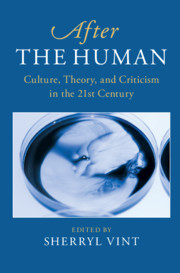Book contents
- After the Human
- After Series
- After the Human
- Copyright page
- Contents
- Contributors
- Acknowledgments
- Introduction
- Part I After Humanism
- Chapter 1 Historicizing Posthumanism
- Chapter 2 Poststructuralism and the End(s) of Humanism
- Chapter 3 Postmodernism
- Chapter 4 Embodiment and Affect
- Chapter 5 Requiem for a Digital Humanist
- Part II New Objects of Enquiry
- Part III Posthumanities
- Collective Works Cited
- Index
Chapter 4 - Embodiment and Affect
from Part I - After Humanism
Published online by Cambridge University Press: 26 November 2020
- After the Human
- After Series
- After the Human
- Copyright page
- Contents
- Contributors
- Acknowledgments
- Introduction
- Part I After Humanism
- Chapter 1 Historicizing Posthumanism
- Chapter 2 Poststructuralism and the End(s) of Humanism
- Chapter 3 Postmodernism
- Chapter 4 Embodiment and Affect
- Chapter 5 Requiem for a Digital Humanist
- Part II New Objects of Enquiry
- Part III Posthumanities
- Collective Works Cited
- Index
Summary
This chapter examines the implications of theories of affect and embodiment for posthumanism. It argues that the recognition of bodies as fluid, co-composed, material and relational constitutes a crucial site for the emergence of the posthumanities. After examining the impact of Spinoza on Western ontologies of the body via Gilles Deleuze, the chapter addresses the affective turn in the humanities and social sciences and its consequences for how we understand affect, embodiment and the human. From affect as autonomous intensity to the cultural politics of affect to queer theories of embodiment in, this chapter shows how theories of affect and embodiment leads to the limits of the human and humanist knowledge production. This question of bodies, however, also exposes problems in the desire to move ‘beyond the human,’ when many racialized bodies were never fully counted as human. Scholars discussed include Brian Massumi, Sarah Ahmed, Anna Gibbs, Erin Manning, Judith Butler, Lauren Berlant, Dana Luciano, Mel Chen, Eliza Steinbock, Zakkiyah Jackson and Jasbir Puar.
Keywords
Information
- Type
- Chapter
- Information
- After the HumanCulture, Theory and Criticism in the 21st Century, pp. 58 - 71Publisher: Cambridge University PressPrint publication year: 2020
Accessibility standard: Unknown
Why this information is here
This section outlines the accessibility features of this content - including support for screen readers, full keyboard navigation and high-contrast display options. This may not be relevant for you.Accessibility Information
- 1
- Cited by
